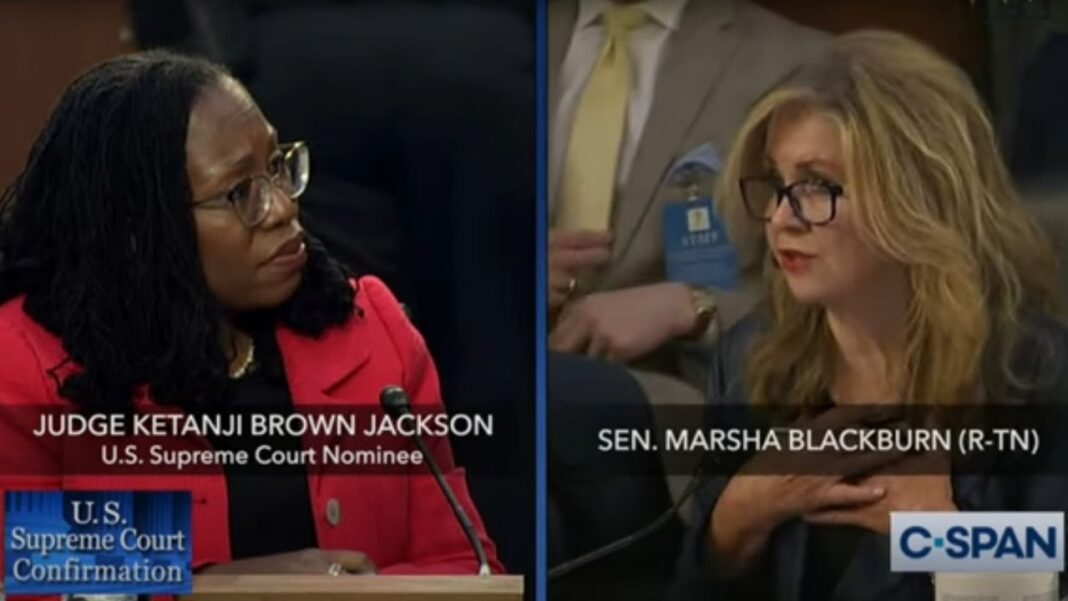Georgetown Day School, the private Pre K-12 school where Judge Ketanji Brown Jackson sits on the board of trustees, teaches radical critical theory pedagogy, and boasts on its website “everyone will engage in the work of social justice within all aspects of school life” — which Judge Jackson would be required to “support” and “promote” as a member of the board.
During her second day of questioning by senators on Tuesday, Judge Jackson took questions from a number of Republicans pertaining to her opinion on “Critical Race Theory” — and Sen Ted Cruz (R-TX) specifically probed her on race-essentialist materials being taught at Georgetown Day School, such as “Antiracist Baby” by Ibram X. Kendi.
However, teaching “Antiracist Baby” is not the only radical material being pushed on children at the school where Judge Jackson sits on the board.
GDS brags about its far-left curriculum in its 2021-22 high school profile “curricular highlights,” showcasing a course, for instance, about “Exploring Reproductive Justice,” and a 9th Grade Seminar “flagship social justice course that serves as a launching point for a GDS High School Education.”
The school hosted a speech in September, 2020, by Dr. Dena Simmons, called “Self-Care, Healing, and Equity-Responsive Practices,” which discussed “opening the door for our continued anti-racist work.”
A GDS teacher also led a talk at a conference in 2018 called, “Sticks and Stones: Exploring the ’N-Word’ in our School Communities.”
The elite private school touts on its website that it is a “proud recipient” of the “Leading Edge Award for Equity and Justice,” from the National Association of Independent Schools, which, as Breitbart News has previously reported, is a central purveyor of race-essentialist teaching materials to private schools across the country.
Georgetown Day School, which has over 1000 students, has assets totaling roughly $288 million as of fiscal year 2020, and the headmaster is paid over $1 million yearly salary, according to the school’s 990 form. Tuition to the school is $40,000-$50,000 per year.
The school offers “anti-racist resources” on its website, including reading materials titled, “Growing up a Black man in America: Why Our Souls are on Fire,” “Your Black Colleagues May Look Like They’re Okay—Chances Are They’re Not,” “Maintaining Professionalism in the Age of Black Death Is…A Lot,” “White Supremacy Culture,” and “The End of Policing.”
The “resources” list also includes a section for kids, including titles such as, “The Very Best Code Switch Episodes For Kids,” “Picture Books for Young Activists,” “The Little Book of Little Activists,” “Not My Idea: A Book About Whiteness,” and “Racial Microaggressions in Everyday Life.”
The school falls in line with a pattern of elite private schools across the country adopting radical leftist curricula and school policy, as previously reported by Breitbart News.
The school takes part in the People of Color Conference NAIS teacher training, according to its website, which has been previously reported on by Breitbart News as having been launched by Black Panther member Randolph Carter, and includes lectures such as, “Cultivating Anti-Racists and Activists in Kindergarten,” “Decolonizing the Minds of Second Graders,” and “The White People Way.”
Carter’s wife, Elizabeth Denevi, also worked at Georgetown Day School for ten years where she served as the co-director of diversity and as a senior administrator, according to Denevi’s website, teachingwhilewhite.org.
Georgetown Day School also currently takes part in another teacher training called “White Privilege Conference,” described on the school’s website as “a venue for fostering difficult and critical dialogues around white supremacy, white privilege, diversity, multicultural education and leadership, social & economic justice, and the intersecting systems of privilege and oppression.”
GDS also claims to take part in the National SEED (Seeking Educational Equity and Diversity) Project on Inclusive Curriculum “development project,” which aims to “develop ways of understanding complex intersections between self and systems with regard to race, class, gender, sexual orientation, physical ability/disability, and other lived cultural experiences.”








